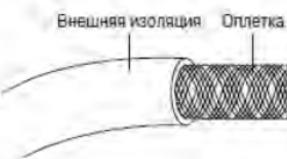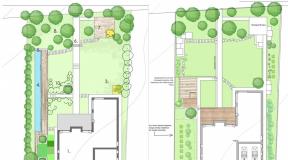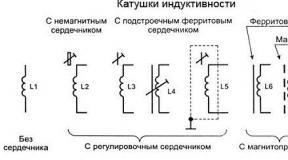Sample appeal against the decision of the arbitration court in the first instance. Appeal sample arbitration. Filing an appeal
An appeal to an arbitration court is a procedural document in which the applicant asks to cancel or change the decision of the first instance that has not entered into legal force.
Basic Rules for Appeal to Arbitration
An appeal drawn up in accordance with the rules established by Chapter 34 of the Arbitration Procedure Code of the Russian Federation has the following features:
- the appeal is filed by persons who participated in the case (plaintiff, defendant, third party) or did not participate (if a judicial act was issued in relation to their rights and obligations);
- its filing is possible only in relation to a decision that has not entered into force;
- submitted through the first instance;
- the applicant cannot include in it new requirements that were not the subject of consideration in the court of first instance.
In order for your appeal against the decision of the arbitration court to be satisfied, make sure that there is at least one of the grounds provided for this Article 270 of the Arbitration Procedure Code of the Russian Federation:
- incomplete determination of the circumstances relevant to the case;
- lack of evidence established by the judge of the circumstances that influenced the outcome of the case;
- inconsistency of the conclusions of the judge with the available evidence;
- violation or misinterpretation by the judge of the norms of substantive or procedural law.
According to article 262 of the Arbitration Procedure Code of the Russian Federation, the person participating in the case has the right to send his response to the appeal to the arbitration court, citing his arguments and objections. The review is drawn up according to the same rules and form as the appeal.
Compilation procedure
Step 1. Hat, which includes:
- full name of the court;
- details of the persons involved in the proceedings (for organizations, this is the name, TIN, PSRN, address, for individuals - full name, passport details and contact information);
- the name of the arbitration court that adopted the contested decision, the number of the case, the date of the decision, the subject of the dispute.
Example:
To the Fifth Arbitration Court of Appeal
191000, St. Petersburg, st. Petrovskaya, 55
through the Arbitration Court of St. Petersburg and
Leningrad region
191000, St. Petersburg, Ivanovskaya st., 1
Plaintiff: Odin LLC
Address: 191000, St. Petersburg,
st. Sidorovskaya, 53.
Respondent: OOO "Dva"
191000, St. Petersburg,
st. Kuznetsovskaya, 33.
Price (cost) of the claim: 11,111 rubles. 11 kopecks.
The amount of state duty: 3000 rubles. 00 kopecks
Appeal
On the decision of the Arbitration Court of St. Petersburg and the Leningrad Region dated November 11, 2017 in case No. А11-22222/2020
Step 2. Main body of the appeal. Here it is necessary to describe the essence of your requirements and the grounds on which the decision is being appealed. To increase your chances, you should indicate links to laws and other significant circumstances that are relevant to the case.
Example:
Odin LLC filed a lawsuit against Dva LLC to recover the debt for the delivered goods in the amount of 22,222 rubles. 22 kopecks.
By the decision of the Arbitration Court of St. Petersburg and the Leningrad Region dated November 11, 2017 in case No. A11-22222/2017, 333,333 rubles were recovered from LLC Dva in favor of LLC Odin. 36 kopecks of debt and 3333 rubles. 26 kopecks of a penalty, total 336,666 rubles. 62 kopecks, as well as 2632 rubles. 83 kopecks in reimbursement of expenses for the payment of state duty.
Odin LLC does not agree with the decision made, considers it illegal, since the court of first instance did not fully examine the evidence in the case, the court’s conclusions do not correspond to the circumstances of the case, and the norms of substantive (and procedural) law are incorrectly applied.
When concluding the said supply agreement, in paragraph 6 the parties provided for a letter of credit form of payment. This assumes that the supplier fulfills his obligations under the supply contract after the buyer opens a letter of credit. But the supplier LLC Odin, without waiting for the opening of the letter of credit, delivered the goods to LLC Dva, in connection with which he violated the delivery procedure stipulated by the contract on the basis of Art. 509 And 516 of the Civil Code of the Russian Federation. But the court did not take this circumstance into account when deciding on the case under consideration. And ruled in favor of the plaintiff, referring to Art. , 516 of the Civil Code of the Russian Federation, recovered from OOO Dva 44,444 rubles. 36 kopecks of debt and 5555 rubles. 26 cents penalty.
LLC Dva does not agree with this decision, as it believes that it is based on the incorrect application of civil law norms. Thus it is the court's decision to collect debts, penalties, as well as the amount of reimbursement for the payment of state duty, the total total amount of 666 666 RUB. 46 cents is wrong.
Step 3. Making a request. The sample appeal to arbitration shows that it usually contains references to the articles of the APC and the word “please”. You can ask to cancel the decision in whole or in part.
Example:
Given the above and guided by Art. 257, 260, - 270 APC RF,
ASK
Cancel the decision of the Arbitration Court of St. Petersburg and the Leningrad Region dated November 11, 2017 in case No. A11-22222/2020 and refuse Odin LLC to fully satisfy the claims.
Step 4. The final part. It contains a list of attached documents, the signature of the applicant (or the person who represents his interests by proxy) and the date the document was drawn up.
Example:
Appendix
The list of attached documents in accordance with Part 4 of Art. 260 APK. Documents are attached in the following order:
- A copy of the contested decision.
- A document confirming the payment of state duty.
- A document confirming the sending of a copy of the appeal to other persons.
- A copy of the power of attorney for the right to sign the appeal, if the complaint is signed by the representative of the applicant.
- Applications, if any.
- Other relevant documents.
If you do not want your appeal to be dismissed, you must attach the following documents to it:
- a copy of the contested decision;
- receipt of payment of state duty;
- confirmation of the direction of the complaint to all persons participating in the case (postal checks);
- a power of attorney or other official paper confirming the authority to sign the appeal.
Please note that the complainant is obliged to send to all participants in the case not only the text itself, but also all the attached documents. This can be done either by registered mail with notification, or in person against receipt.
Deadlines for submission and consideration
In accordance with Article 259 APC RF, the parties have a month to appeal after the verdict. The current legislation provides for the possibility of extending the period for filing an appeal to arbitration process if the applicant had good reasons for his absence. To do this, it is necessary to file an appropriate application, indicating in it the reasons for the delay in filing an appeal (illness, long-term departure, etc.). Also, the term will be restored if the applicant proves that he did not know about the court decision, the content of which affects his rights and obligations.
The Arbitration Procedure Code of the Russian Federation also establishes a reduction in the time for appeal (10 days) for certain categories of cases, for example:
- on cases of bringing to administrative responsibility;
- in cases considered in summary proceedings;
- in bankruptcy proceedings.
It is also necessary to remember that the appeal is filed through the first instance, which, in turn, forwards it to the Court of Appeal along with all the materials of the case within three days.
In order to cancel or change the decision of the Court of Appeal of First Instance, which has not yet entered into force, a special procedural document is drawn up and submitted - an appeal. Next, we will consider by whom and how it is drawn up, when and in what order it is submitted, whether payment of state duty is required.
When and by whom is the appeal filed?
The ruling made by the arbitration court can be challenged by filing a complaint through the same court, as indicated in paragraph 1 of Art. 257 APC RF. As a rule, cases that are related to contractual relations or the implementation of entrepreneurial activities are appealed. For example, cases related to:- protecting the business reputation of the company;
- challenging contracts;
- or bankruptcy of the organization;
- damages, etc.
- persons who took part in the case, including the plaintiff and the defendant;
- persons who are not parties to the case, but the decision directly relates to their rights and obligations;
- persons who are legal successors of the parties to the case, but who are not involved in the proceedings, after which an unsuitable decision was made;
- prosecutor, even if he participated in the proceedings, but if the case is specified in paragraph 1 of Art. 52 FZ No. 95, as set out in paragraph 1 of the decision of the Plenum of the Supreme Arbitration Court of the Russian Federation.
- the facts that influenced the consideration of the case were determined incompletely or incorrectly;
- the accepted definition does not correspond to the evidence considered during the trial;
- the definition was adopted with a violation or incorrect interpretation of the applicable legislative norms;
- the case was considered by a judicial board, which was not in the legal composition;
- the case was considered without persons who were not properly notified of the time and place of the meeting.
If the decision of the arbitral tribunal is made in violation of the accepted norms, it is subject to challenge.
Submission deadlines
In Art. 259 of the APC establishes rules regarding the time limits for filing a complaint, according to which an appeal can be filed within a month after the decision was made. Then, within 3 days, the complaint is redirected to the court of higher instance, and all the materials available on this case are attached to it.At the same time, it should be noted that in relation to some cases there are short deadlines - they can be appealed only within 10 days from the date of the verdict. These are:
- cases concerning bringing to administrative responsibility;
- cases that were considered in a simplified manner;
- bankruptcy cases.
- serious illness, long business trip, ignorance of the appeal period and other circumstances that are directly related to the applicant;
- ignorance of the court verdict directly related to the rights and obligations of the applicant;
- receipt of copies of the court decision after the period during which the enforcement was subject to appeal;
- lack of explanations by the court regarding the procedure for appeal.

Only those complaints are accepted for consideration, for which the time limit for appeal has not expired or a petition is attached to the complaint with a request to restore this time limit.
Drawing up a complaint and its sample
If the complaint is not formalized correctly, the court may refuse to accept it for consideration, therefore, special attention must be paid to this issue. A complaint can be filed with the help of a professional lawyer or independently, in any case, it must meet the requirements specified in Art. 260 APK.It is filled in in the following order:
1. A "header" of the application is drawn up, which consists of the following information:
- the name of the judicial body in full;
- details of the parties involved in the case, for example, the plaintiff and the defendant (legal entities indicate the name, TIN, PSRN and address, and individuals - full name, address of registration and actual residence, contact information);
- case number;
- document name (centered);
- the full name of the court that made the unsuitable decision, the date of its issuance.
- date of adoption of the verdict and its essence (claims of the plaintiff, facts established by the court);
- the essence of the requirements and the grounds on the basis of which the court's verdict must be canceled or changed (in order to increase the chances of a successful appeal, it is worth referring to the laws and circumstances that are of factual significance for the case).
The complainant does not have the right to demand something that was not considered in the appellate court of first instance. If there are new requirements, you will need to apply to the arbitration court with an appropriate application.
3. The pleading part is indicated, which begins with the word “I ask” from the central part of the sheet. It is noted here whether the applicant wishes to completely reverse the decision or change parts of it that directly relate to the person of the applicant.
4. A final part is drawn up, which lists the names of the documents that are attached to the complaint. The part begins with the word "Applications". So, to increase the chance of a successful appeal, you should attach the following papers:
- a copy of the unacceptable decision;
- a receipt confirming the fact of payment of the state fee (either documents stating that the applicant has benefits when paying the fee, or an application for installment/deferred payment or reduction of the fee);
- supporting documents stating that all persons participating in the case received a copy of the appeal (for example, postal checks may be such documents);
- a document stating that the person signing the complaint has grounds for this (for example, a power of attorney).
All documents attached to the complaint can be submitted in electronic format.
5. The signature of the applicant or his legal representative is put opposite his initials, as well as the date of the complaint.

How to apply?
According to paragraph 1 of Art. 260 FZ No. 95, documents can be submitted in two formats:- Written. A package of papers can be submitted directly by contacting the court office in person or by registered mail, and you will need to draw up an inventory of the attachment and receive a notice of successful delivery of the letter.
- Electronic. All papers can be sent through the official website of the arbitration court. This is determined by the decision of the Plenum of the Supreme Arbitration Court No. 80 of 08.11.2013.
Without attaching a receipt confirming the payment of state contributions, the complaint is not accepted, so the review of the case will not be possible. To avoid this, you will need to pay a fee. Its amount is 50% of the state duty for filing a non-property claim, which is indicated in subpara. 12 p. 1 art. 331.21 tax code RF. So, if the state duty for a property claim is 6,000 rubles, then the state duty for filing an appeal is 3,000 rubles.
If the court satisfactorily considers the claims set out in the complaint, the applicant's opponents will most likely be held responsible for reimbursement of all legal costs.

Terms of consideration
According to Art. 267 APC, the appeal must be considered within 2 months from the date of its receipt. But it is worth noting that office work will not be open at all due to the following reasons:- the complaint was filed by a person who does not have the right to do so;
- the applicant requests to appeal against the court decision, which cannot be reviewed within the framework of the appeal proceedings;
- the deadline for filing an appeal has expired;
- the complainant personally withdrew his application;
- there are grounds on the basis of which the application should remain without movement (Article 263 of the APC).
If the court decides to return your appeal, you can resubmit your appeal after correcting any deficiencies.
So, if the decision of the Court of Appeal has not yet entered into force, it can be appealed. To do this, a complaint must be sent to the court of first instance within 30 days from the date of the announcement of an unsuitable decision. It must be correctly drawn up, otherwise the appeal proceedings will not be initiated.
The form of the document "Appeal against the decision of the Arbitration Court" refers to the heading "Appeal". Save a link to the document in in social networks or download it to your computer.
To __________ Arbitration Court of Appeal
_____________________________________________
plaintiff: LLC "_____________________________"
Mailing address:________________________________
Respondent: LLC "_______________________________"
Legal address:____________________________
Government duty: ______________________
Case: No. _________________
APPEALS
on the decision of the Arbitration Court of the city of _______ dated __________ in case No. _____________ (on the claim of LLC "____________________" against LLC "____________" for the recovery of debt)
By the decision of the Arbitration Court of _______ dated __________, from the Limited Liability Company "______________" in favor of the Limited Liability Company "____________" ___________ rubles __ kop. and reimbursement of court costs for payment of the state fee - ______ rubles.
I consider this decision of the court illegal, unreasonable and subject to change on the following grounds:
1. Incomplete clarification by the court of first instance of the circumstances relevant to the case.
In its decision, the court of first instance refers to the fact that the parties concluded a framework supply agreement No. ____ dated ____________ (with annexes), under which the defendant supplied the goods to the plaintiff.
According to the terms of the supply agreement for the supplier, in addition to the obligations to supply the goods, special obligations of the supplier are established, including the obligations of the supplier (LLC "_____________") to pay premiums to the plaintiff.
In accordance with the terms of the supply agreement, the supplier pays the buyer the amounts of discounts and premiums agreed by the parties specified in the relevant Appendix No. __ to the supply agreement in relation to the relevant periods of the relationship between the parties.
The amounts and types of discounts and premiums are determined and established by Annex No. __ to the framework agreement.
The volume of commodity purchases under the framework contract is determined in the annual certificates of volumes, the fact of delivery for ___________ y.y. also confirmed by the consignment notes presented in the case.
In addition, the plaintiff, within the framework of obligations under the framework agreement, issued invoices for the payment of premiums, which is documented.
And, since, as the court pointed out in its decision, the plaintiff provided evidence of debt under the supply agreement to the payment of the premium, the claims should be recognized as legitimate, reliable, proven and subject to satisfaction.
However, the trial court unreasonably reached such a premature conclusion by not fully examining the actual circumstances of the case.
In this case, the contract for the supply of goods was concluded in full compliance with the requirements of civil law, in particular, Chapter 30 of the Civil Code of the Russian Federation.
According to Art. 507 of the Civil Code of the Russian Federation, in the event that, when concluding a supply contract, disagreements arose between the parties on certain terms of the contract, the party that proposed to conclude the contract and received from the other party a proposal to agree on these conditions must, within thirty days from the date of receipt of this proposal, unless otherwise the term is not established by law or not agreed by the parties, take measures to agree on the relevant terms of the contract or notify the other party in writing of the refusal to conclude it.
In accordance with paragraph 3. 5 of the Agreement - the general terms of delivery - the amounts to be withheld after the completion of the transaction are paid to the buyer once a year for the period up to ___________ of the previous year, while the total amount of turnover achieved by the buyer and supplier is taken as the basis for calculations during the reporting period.
Satisfying the claims, the court of first instance referred to the act of reconciliation between the parties, which, allegedly, as the representative of the plaintiff claimed, reflected the amount of debt on the actually delivered and sold goods.
However, these statements are not true.
The court of first instance in favor of the plaintiff recovered _______ ruble __ kopecks.
At the same time, according to the act of reconciliation of mutual settlements carried out between the parties, the debt of ________________ LLC to _____________________ LLC amounted to ______ rubles __ kopecks.
All our objections to the claims made by __________________ LLC were not taken into account by the court of first instance, which was the reason for the unjust decision, due to the incomplete clarification of the circumstances relevant to the case.
All of the above circumstances led to the issuance of an unjust decision that violates the rights and legitimate interests of ________________________ LLC.
Based on the above and guided by Article.Article. 4, 257, 259, 260, 270, APC RF, -
P O W U S U D:
1. The decision of the Arbitration Court of _______ dated __________ in case No. __________________ on the claim of _____________ LLC against _______________ LLC for the recovery of debt - amend.
2. Adopt a new judicial act in the case, by which the claims of LLC "__________________" against LLC "______________" for the recovery of debt - partially satisfy, recovering from LLC "____________________" in favor of LLC "__________________" in compensation of debt ______ rubles __ kopecks.
3. To recover from LLC "_____________________" in favor of LLC "_____________________" the costs of paying the state fee in the amount of __________ rubles.
Appendix:
1. receipt of payment of the state fee;
2. copies of the appeal;
3. receipts for sending a copy of the appeal to the plaintiff;
4. a copy of the decision of the Arbitration Court of ________ dated ___________;
CEO
OOO "____________________" _____________
" " ________________ of the year
-
It's no secret that office work has a negative impact on both physical and mental health. mental state worker. There are quite a lot of facts confirming both. -
At work, each person spends a significant part of his life, so it is very important not only what he does, but also who he has to communicate with.
A brief appeal to the arbitration court is used quite often. It is worth noting the fact that there is no such legal term.
This is just a colloquial common expression, it is also called - preliminary to the decision of the arbitration court. Lawyers use and use this technique as a countermeasure in response to the tricks of judges and their assistants.
About what kind of problems can be avoided by writing a brief complaint, what kind of goals can be achieved as a result of using this tool and will be discussed in our article. The information presented will be very useful and interesting in any case. So read carefully.
In this article:
How to write a short appeal against the decision of the arbitration court
The drafting of this document should be done as clearly and accurately as possible. It is necessary to take into account the fact that the reasons that prompted to, must be stated in such a way that they make it clear to the court about what violations there are when making a decision.
The task is really difficult. This requires experience and knowledge in the field of law. It is better to seek help from a law firm.
The courts very often leave such complaints without movement.
And for completely different reasons, such as:
- Wrong complaint.
- Lack of indications of any events of importance.
- Failure to comply with the deadline for filing a complaint.
- Violation of other procedural rules.
Frankly, very often, these so-called reasons are just a screen or veil to hide the true reasons.
In order to better understand the essence of this problem, you need to talk about when and under what circumstances the concept of a brief appeal appeared in.
When is a Complaint Necessary?
During the period of transition from the Soviet system of law to the modern Russian one, there was a sharp increase in the number of subjects who began to master the so-called economic activity. As a result, the demand for dispute resolution in the arbitration court has increased significantly.
It should be noted that earlier the court decision took ten days to come into force, but now a month should pass. Due to the heavy workload of the judges, they simply did not have time to make a final decision on the case.
Thus, a situation was created that after the judges, those who wished to file an appeal court acted belatedly.
Therefore, experienced lawyers began to file an appeal without waiting for the judge to issue a reasoning, that is, the final part of the decision. The basis for filing a complaint, in this case, is the presence of the operative part, which the judge announces at the meeting.
To eliminate such conflicts, the legislator changed the terms for the entry of court decisions into longer ones. However, the demand for arbitration continues to grow and judges have not become less busy. Based on this, the concept of a brief complaint in the arbitration process remained relevant.
Some nuances related to complaints
As mentioned above, the judges of arbitration courts are overloaded with work. It really is. Therefore, untimely decisions appear in their work. In general, it is worth clarifying that the judge has five days to draw up a motivational part and make a full reasoned decision on the case.
Despite this, participants in arbitration often receive letters from the courts, the content of which indicates that, due to heavy workload, the five-day deadline is being postponed.
When announcing the operative part at a court session, this date is set, and after the final decision is made, the judges do not change it.
Thus, there is an artificial omission of deadlines for filing an appeal. That's why a brief complaint is needed in the arbitration process.
The tricks that have been given may be faced by an arbitrator if he does not have experience in such cases.
And since a brief complaint requires a special approach in writing, such an inexperienced person, as a rule, makes a mistake, the court ignores it, and then the chances of filing an appeal on time turn into nothing.
What should a brief complaint contain?
In fact, a brief complaint differs from the usual one in the content of the essence of the problem. In other words, in the place where the reasons for disagreeing with the decision of the court of first instance are indicated, brevity is needed.
Again, the wording should be such that the essence of the problem is not lost. At the same time, it must be taken into account that an ordinary complaint is written based on the content of the motivational part and on it.
A brief complaint is drawn up in the absence of information about the motives for the decision by the court. However, one cannot build one's arguments on the resolutive part alone. The court may leave it without motion, pointing to unreasonableness.
Therefore, it is necessary, at least partially, to foresee the motivational part and use interpretations that are relevant to the final decision of the court.
All these difficulties can be easily overcome by an experienced arbitration lawyer. Call us and we will tell you what your brief appeal to the arbitration court should contain. A sample for general writing can be downloaded from our website.
Generalizations and useful advice when filing a preliminary appeal with an arbitration court
So, a brief complaint to the arbitration court should be written if:
- There is a delay in the final decision in the arbitration case.
- There is confidence about what the motivational part will contain.
- There are solid grounds for appeal.
- As an option, delay the consideration of the case.
In other cases, of course, there may be hope for success, but you should not delude yourself too much.
Well, in order for everything to go smoothly, you need to contact a law firm. There are too many nuances, and, therefore, the chances of making a mistake are very high. No need to take risks. This will not lead to success.
An example of a brief appeal to the arbitration court
Below in the word file you can download an example of a brief complaint to arbitration, which will give an idea on how to draw up this procedural document.



















